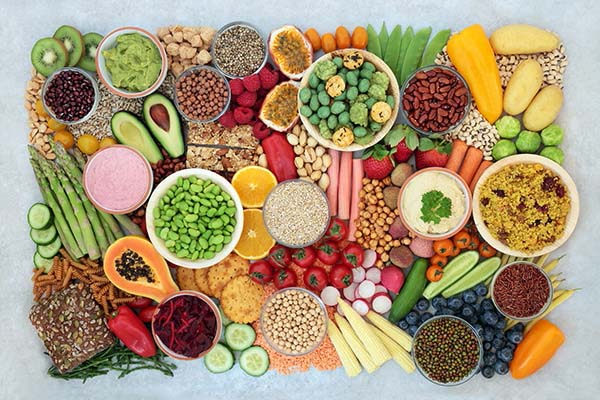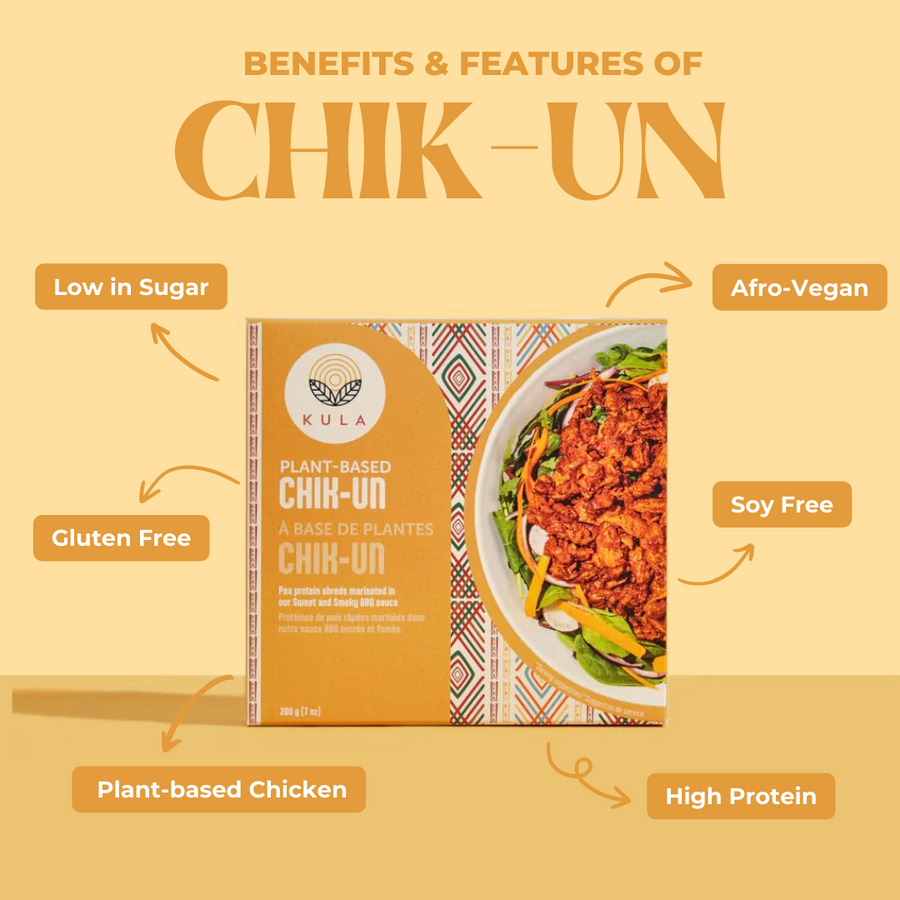The Ultimate Guide to Cooking with Gluten Free BBQ Sauce on a Plant-Based Diet
The Ultimate Guide to Cooking with Gluten Free BBQ Sauce on a Plant-Based Diet
Blog Article
Everything About Healthy Food: Benefits of Taking On Plant Based Choices
The discussion surrounding plant-based diet plans has acquired considerable focus in recent years. Many individuals are discovering the possible health benefits, nutritional benefits, and ecological impacts related to these nutritional options. As people become much more knowledgeable about their food's impact on wellness and sustainability, inquiries arise concerning the usefulness of embracing such a lifestyle. What certain adjustments can one expect, and how might these selections improve not just individual wellness but likewise the planet's future?
Recognizing Plant-Based Diet Plans
Numerous individuals associate plant-based diet plans primarily with vegetarianism or veganism, these diet regimens can include a wide variety of eating patterns that focus on whole, minimally refined plant foods. Such diets frequently consist of fruits, vegetables, entire grains, legumes, nuts, and seeds, while limiting or eliminating pet items. This flexibility allows individuals to customize their nutritional choices according to nutritional requirements and individual choices. Some may embrace a mainly plant-based diet regimen while still occasionally consuming meat or dairy products, often described as a flexitarian technique. The emphasis remains on integrating even more plant foods, which can result in a varied selection of tastes and dishes. Understanding these different analyses of plant-based eating is necessary for valuing its ease of access and charm in contemporary food culture.
Health Advantages of Plant-Based Foods
The wellness benefits of plant-based foods are significant, providing a nutrient density benefit that sustains total health. Study shows that these foods can improve heart health and play a necessary duty in reliable weight management. By integrating a lot more plant-based choices, individuals might boost their nutritional selections and advertise long-term health and wellness.
Nutrient Thickness Advantage
Nutrient density plays a vital duty in the wellness advantages of plant-based foods, making them an engaging option for those looking for a well balanced diet plan. Plant-based foods, such as fruits, vegetables, legumes, nuts, and whole grains, are commonly abundant in necessary vitamins, minerals, and antioxidants while being lower in calories. This high nutrient density allows people to eat less calories while still satisfying their dietary requirements. Additionally, these foods are loaded with nutritional fiber, promoting gastrointestinal health and aiding in weight monitoring. By including nutrient-dense plant-based options, customers can enhance their general health and wellness, support their immune systems, and minimize the danger of persistent illness. Ultimately, the nutrient thickness of plant-based foods highlights their significance in a health-conscious way of life.
Heart Health Renovation

Weight Monitoring Assistance
In addition to advertising heart wellness, a plant-based diet plan can substantially help in weight monitoring. This dietary technique highlights entire foods such as fruits, vegetables, beans, nuts, and entire grains, which are generally reduced in calories and higher in fiber contrasted to animal-based products. The high fiber material helps increase satiety, decreasing total calorie intake. In addition, plant-based diet plans are typically rich in necessary nutrients while low in undesirable fats, making it easier to keep a healthy weight. Plant Based Beef. Research study shows that individuals who take on a plant-based way of life often tend to have lower body mass indexes (BMIs) and experience more effective weight loss contrasted to those that consume meat-heavy diet plans. Subsequently, embracing plant-based alternatives is a strategic choice for efficient weight administration
Nutritional Worth of Plant-Based Ingredients
Plant-based ingredients are rich in important nutrients, using a diverse variety of vitamins, minerals, and anti-oxidants that contribute to overall health. A contrast of healthy protein resources discloses that while pet products are commonly considered as exceptional, many plant-based choices supply appropriate healthy protein and other beneficial compounds. Understanding the dietary worth of these active ingredients can aid people make notified dietary choices.
Necessary Nutrients in Plants
Nutrient-rich active ingredients located in plants use a varied range of crucial vitamins and minerals that add substantially to general wellness. These active ingredients are abundant in vitamins A, C, and K, which support immune function, vision, and blood clot, specifically. In enhancement, plants supply crucial minerals such as potassium, magnesium, and calcium, essential for heart wellness, muscle function, and bone toughness. The existence of fiber in plant-based foods aids digestion and promotes a healthy and balanced digestive tract microbiome. Anti-oxidants, located perfectly in vegetables and fruits, assistance combat oxidative anxiety and minimize inflammation. Many plant foods are reduced in calories yet high in nutrients, making them an excellent option for those looking for to preserve a healthy and balanced weight while guaranteeing excellent nutrient consumption.

Contrasting Healthy Protein Resources
Healthy protein sources differ considerably in their nutritional accounts, with plant-based components supplying special benefits. Unlike animal proteins, which frequently include hydrogenated fats and cholesterol, plant healthy proteins have a tendency to be lower in these unhealthy parts. Legumes, nuts, seeds, and whole grains are rich in important amino acids, fiber, vitamins, and minerals. As an example, lentils give high healthy protein material together with significant iron and folate, while quinoa is a complete healthy protein, providing all 9 crucial amino acids. Furthermore, plant-based proteins are usually gone along with by antioxidants and phytochemicals that sustain general health. The change to plant-based protein resources not just boosts dietary consumption however also aligns with lasting dietary techniques, minimizing ecological influence and advertising long-term health and wellness advantages.
Environmental Impact of Plant-Based Consuming
As understanding of environment change grows, many people are exploring sustainable nutritional choices that can considerably minimize their environmental footprint. Plant-based consuming has actually arised as a substantial contributor to decreasing greenhouse gas exhausts, which are primarily connected with livestock production. The cultivation of fruits, beans, grains, and veggies usually needs less resources, such as water and land, compared to animal farming. Furthermore, plant-based diets can cause lowered logging, as much less land is needed for grazing animals or growing animal feed. By shifting towards plant-based choices, consumers can support biodiversity and promote healthier environments. On the whole, accepting plant-based consuming not just advantages individual wellness but also represents an important step toward environmental sustainability and conservation efforts.
Overcoming Common Misconceptions
While numerous individuals identify the advantages of a plant-based diet regimen, numerous misconceptions often prevent them from totally welcoming this way of life. A typical belief is that plant-based diet plans lack adequate protein; however, numerous plant sources, such as vegetables, nuts, and tofu, supply sufficient protein. Additionally, some assume that this diet plan is expensive, when in fact, staples like beans, rice, and seasonal veggies can be quite budget-friendly. An additional misunderstanding is that plant-based consuming is excessively restrictive, whereas it really provides a diverse array of foods and tastes. Numerous stress that a plant-based diet plan might lead to shortages, yet with correct preparation, individuals can acquire all necessary nutrients, consisting of vitamins and minerals, while appreciating a large variety of tasty meals. Vast Tips for Transitioning to a Plant-Based Way of life
Making the change to a plant-based way of life can be an improving experience, though it commonly needs some advice to navigate site link the preliminary changes. Initially, people are encouraged to start progressively, incorporating more fruits, veggies, legumes, and whole grains right into their dishes while minimizing meat and dairy intake. Meal preparation is necessary; preparing a regular food selection can help relieve the modification and prevent last-minute undesirable selections. Discovering new dishes and cooking methods can likewise maintain and enhance the experience enjoyment about plant-based consuming. In addition, signing up with support system or areas can provide motivation and share important ideas. Lastly, remaining educated about nutrition guarantees balanced dishes, protecting against deficiencies while fostering a healthy, satisfying plant-based lifestyle.
Delicious Plant-Based Meal Concepts
Exploring scrumptious plant-based dish concepts can inspire people to accept a more healthy diet. One popular choice is a hearty quinoa salad, featuring cherry tomatoes, cucumber, and a vibrant lemon-tahini dressing. One more fave is a full-flavored lentil stew, loaded with carrots, celery, and aromatic natural herbs, perfect for a soothing dinner. For breakfast, over night oats made with almond milk, chia seeds, and covered with fresh berries give a nutritious start to the day. Furthermore, a vivid veggie stir-fry with tofu and a variety of vibrant veggies can be a fast yet pleasing meal. Creamy avocado toast on whole-grain bread, sprinkled with seeds and flavors, uses an easy yet tasty snack. These meals showcase the range and splendor of plant-based consuming.

Often Asked Concerns
Can a Plant-Based Diet Regimen Provide Sufficient Protein?
The question of whether a plant-based diet regimen can offer sufficient protein prevails. Various resources, including legumes, nuts, seeds, and entire grains, can satisfy healthy protein needs effectively, sustaining a nutritious and our website well balanced diet for people.
Are Plant-Based Diets Ideal for Kid?
The suitability of plant-based diet plans for children depends upon mindful preparation. Appropriate nutrients must be ensured, consisting of minerals, vitamins, and proteins. With correct assistance, such diets can sustain healthy growth and growth in children.
Just how Do I Dine Out on a Plant-Based Diet plan?
Eating in restaurants on a plant-based diet includes looking for restaurants with varied food selections, requesting adjustments, and discovering vegan-friendly choices. Planning in advance and communicating dietary choices can improve the dining experience while preserving nutritional selections.
What Are Common Allergens in Plant-Based Foods?
Usual allergens in plant-based foods include soy, gluten, nuts, and seeds - Plant Based Beef. Individuals following a plant-based diet needs to understand these allergens and read labels thoroughly to prevent damaging responses and guarantee safe consumption
Can Plant-Based Diets Aid With Weight Management?
Research study indicates that embracing a plant-based diet plan may assist in weight loss due to its usually reduced calorie thickness and higher fiber material. This combination can enhance satiety, helping individuals manage their caloric intake efficiently. Numerous people associate plant-based diet plans primarily with vegetarianism or veganism, these diets can encompass see this a wide array of eating patterns that focus on whole, minimally processed plant foods. Nutrient density plays an essential role in the health and wellness benefits of plant-based foods, making them an engaging selection for those looking for a well balanced diet plan. Plant-based diet plans have been revealed to substantially boost heart health, as they often include elements that sustain cardiovascular function. In enhancement to advertising heart wellness, a plant-based diet plan can significantly aid in weight monitoring. An usual idea is that plant-based diet plans lack adequate healthy protein; however, countless plant resources, such as legumes, nuts, and tofu, give ample healthy protein.
Report this page